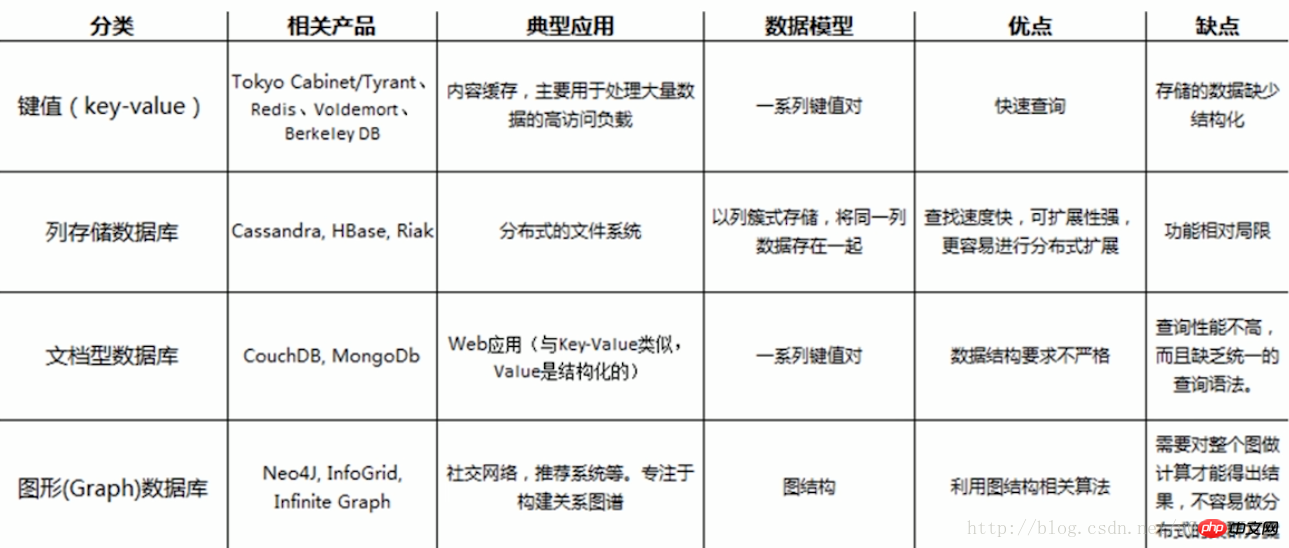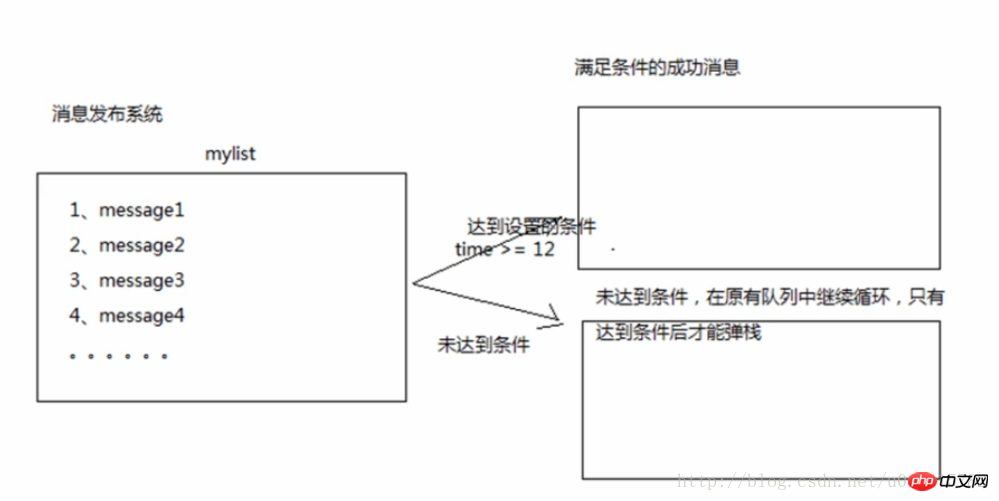Some ways to use Redis in PHP
Redis has great advantages for program developers. Learning these key knowledges will definitely improve our abilities. This article mainly shares with you some methods of using Redis in PHP, hoping to help everyone.
①. Data type
First we need to understand it based on the 7 data types provided by Redis, namely String, Hash, List, Set, Sorted Set, Pub/Sub, and Transactions
②. Related understanding of single thread:

③. Transactions Transactions
We generally think that NoSQL databases do not have transactions, I am afraid we will disappoint you. Redis supports transactions, but they are not transactions in our general sense. If you execute the exec command and the power is cut off or the server hangs up on the way, we will still find that part of it is inserted in Redis and part of it is not.
However, Redis provides the WATCH command. We can watch a certain key and then execute Transactions. If the value of the Watch is modified, the Transactions will find out and refuse to execute.
Commonly used commands include MULTI, EXEC, and DISCARD.
MULTI:标记一个事务块的开始; EXEC:执行所有事务块内的命令; DISCARD:取消事务,放弃执行事务块内的所有命令; UNWATCH:取消 WATCH 命令对所有 key 的监视; WATCH key:监视 key,如果在事务执行之前 key 被其他命令所改动,那么事务将被打断
Redis As a database, many developers can also use it alone. In fact, more often than not, Redis is used as a middleware between the database and the code. If you find that there is a bottleneck in your current database, then you can optimize it through Redis
♬ For code usage
, you can refer to the video - [php operation redis]
Personal simple code:
$redis = new \Redis(); $redis->pconnect('192.168.236.131', '6379'); #连接redis服务
$redis->set('say','moTzxx say hello !');
//echo $redis->get('say'); $redis->delete('myname'); $redis->set('myname','moTzxx'); echo $redis->get('myname').'<br>'; # 返回:moTzxx
var_dump($redis->del('myname'));# 返回 TRUE(1)
var_dump($redis->get('myname')); # 返回 bool(false)
//$redis->set('tag',10); $redis->delete('tag'); $redis->incr('tag');
//$redis->incrBy('tag',3);
var_dump($redis->get('tag')); echo '<hr>'; $redis->delete('list1'); $redis->lPush('list1','hello'); $redis->rPush('list1','miss');
var_dump($redis->rPop('list1')); #string(4) "miss"
echo '<hr>'; $redis->delete('set1'); $redis->sAdd('set1','a'); $redis->sAdd('set1',2); $redis->sAdd('set1','ok'); $redis->sAdd('set1','ok');//TODO 集合的唯一性 $val = $redis->sCard('set1');
var_dump($val); #int(3)
$val2 = $redis->sMembers('set1');
var_dump($val2);#array(3) { [0]=> string(2) "ok" [1]=> string(1) "2" [2]=> string(1) "a" }
echo '<br>'; $redis->set('key1', 'value', 111);
var_dump($redis->get('key1')); $redis->getSet('key1','value11');
var_dump($redis->mget(['tag','key1']));
var_dump($redis->type('tag')); echo '<hr>'; $redis->delete('driver1'); $redis->hSet("driver1",'name','moTzxx'); $redis->hSet("driver1",'age',12); $redis->hSet('driver1','gender',1); $val = $redis->hGet("driver1",'name');
var_dump($val);#string(6) "moTzxx"
$val = $redis->hMGet("driver1",['name','gender']);
var_dump($val); #array(2) { ["name"]=> string(6) "moTzxx" ["gender"]=> string(1) "1" }
echo '<hr>'; $redis->delete('pats'); $redis->zAdd('pats',1,'cat1'); # 构建一个zset (sorted set) // int(1)
$redis->zAdd('pats',3,'dog3'); $redis->zAdd('pats',2,'monkey2'); $redis->zAdd('pats',2,'pig2'); $val = $redis->zRange('pats',0,-1); #从低到高
var_dump($val); //array(4) { [0]=> string(4) "cat1" [1]=> string(7) "monkey2" [2]=> string(4) "pig2" [3]=> string(4) "dog3" } $val2 = $redis->zRevRange('pats',0,-1); #从高到低
var_dump($val2);//array(4) { [0]=> string(4) "dog3" [1]=> string(4) "pig2" [2]=> string(7) "monkey2" [3]=> string(4) "cat1" }
var_dump($redis->TYPE('pats')); //zset / int(4)Execution effect screenshot:

♬ Extension
①. Comparison of four NoSQL databases:

②. Usage scenarios of rpoplpush

How to operate Redis with PHP Example sharing
PHP installation redis extension example under Windows
PHP using Redis example explanation
The above is the detailed content of Some ways to use Redis in PHP. For more information, please follow other related articles on the PHP Chinese website!

Hot AI Tools

Undresser.AI Undress
AI-powered app for creating realistic nude photos

AI Clothes Remover
Online AI tool for removing clothes from photos.

Undress AI Tool
Undress images for free

Clothoff.io
AI clothes remover

Video Face Swap
Swap faces in any video effortlessly with our completely free AI face swap tool!

Hot Article

Hot Tools

Notepad++7.3.1
Easy-to-use and free code editor

SublimeText3 Chinese version
Chinese version, very easy to use

Zend Studio 13.0.1
Powerful PHP integrated development environment

Dreamweaver CS6
Visual web development tools

SublimeText3 Mac version
God-level code editing software (SublimeText3)

Hot Topics
 1664
1664
 14
14
 1423
1423
 52
52
 1317
1317
 25
25
 1268
1268
 29
29
 1246
1246
 24
24
 PHP and Python: Different Paradigms Explained
Apr 18, 2025 am 12:26 AM
PHP and Python: Different Paradigms Explained
Apr 18, 2025 am 12:26 AM
PHP is mainly procedural programming, but also supports object-oriented programming (OOP); Python supports a variety of paradigms, including OOP, functional and procedural programming. PHP is suitable for web development, and Python is suitable for a variety of applications such as data analysis and machine learning.
 Choosing Between PHP and Python: A Guide
Apr 18, 2025 am 12:24 AM
Choosing Between PHP and Python: A Guide
Apr 18, 2025 am 12:24 AM
PHP is suitable for web development and rapid prototyping, and Python is suitable for data science and machine learning. 1.PHP is used for dynamic web development, with simple syntax and suitable for rapid development. 2. Python has concise syntax, is suitable for multiple fields, and has a strong library ecosystem.
 PHP and Python: A Deep Dive into Their History
Apr 18, 2025 am 12:25 AM
PHP and Python: A Deep Dive into Their History
Apr 18, 2025 am 12:25 AM
PHP originated in 1994 and was developed by RasmusLerdorf. It was originally used to track website visitors and gradually evolved into a server-side scripting language and was widely used in web development. Python was developed by Guidovan Rossum in the late 1980s and was first released in 1991. It emphasizes code readability and simplicity, and is suitable for scientific computing, data analysis and other fields.
 PHP's Impact: Web Development and Beyond
Apr 18, 2025 am 12:10 AM
PHP's Impact: Web Development and Beyond
Apr 18, 2025 am 12:10 AM
PHPhassignificantlyimpactedwebdevelopmentandextendsbeyondit.1)ItpowersmajorplatformslikeWordPressandexcelsindatabaseinteractions.2)PHP'sadaptabilityallowsittoscaleforlargeapplicationsusingframeworkslikeLaravel.3)Beyondweb,PHPisusedincommand-linescrip
 PHP vs. Python: Use Cases and Applications
Apr 17, 2025 am 12:23 AM
PHP vs. Python: Use Cases and Applications
Apr 17, 2025 am 12:23 AM
PHP is suitable for web development and content management systems, and Python is suitable for data science, machine learning and automation scripts. 1.PHP performs well in building fast and scalable websites and applications and is commonly used in CMS such as WordPress. 2. Python has performed outstandingly in the fields of data science and machine learning, with rich libraries such as NumPy and TensorFlow.
 The Continued Use of PHP: Reasons for Its Endurance
Apr 19, 2025 am 12:23 AM
The Continued Use of PHP: Reasons for Its Endurance
Apr 19, 2025 am 12:23 AM
What’s still popular is the ease of use, flexibility and a strong ecosystem. 1) Ease of use and simple syntax make it the first choice for beginners. 2) Closely integrated with web development, excellent interaction with HTTP requests and database. 3) The huge ecosystem provides a wealth of tools and libraries. 4) Active community and open source nature adapts them to new needs and technology trends.
 PHP: An Introduction to the Server-Side Scripting Language
Apr 16, 2025 am 12:18 AM
PHP: An Introduction to the Server-Side Scripting Language
Apr 16, 2025 am 12:18 AM
PHP is a server-side scripting language used for dynamic web development and server-side applications. 1.PHP is an interpreted language that does not require compilation and is suitable for rapid development. 2. PHP code is embedded in HTML, making it easy to develop web pages. 3. PHP processes server-side logic, generates HTML output, and supports user interaction and data processing. 4. PHP can interact with the database, process form submission, and execute server-side tasks.
 PHP and the Web: Exploring its Long-Term Impact
Apr 16, 2025 am 12:17 AM
PHP and the Web: Exploring its Long-Term Impact
Apr 16, 2025 am 12:17 AM
PHP has shaped the network over the past few decades and will continue to play an important role in web development. 1) PHP originated in 1994 and has become the first choice for developers due to its ease of use and seamless integration with MySQL. 2) Its core functions include generating dynamic content and integrating with the database, allowing the website to be updated in real time and displayed in personalized manner. 3) The wide application and ecosystem of PHP have driven its long-term impact, but it also faces version updates and security challenges. 4) Performance improvements in recent years, such as the release of PHP7, enable it to compete with modern languages. 5) In the future, PHP needs to deal with new challenges such as containerization and microservices, but its flexibility and active community make it adaptable.





